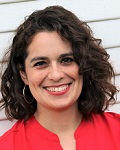2014, 2019
Isabel Huacuja Alonso
- Assistant Professor
- California State University, San Bernardino

Abstract
This dissertation is a transnational historical study of radio broadcasting in Hindi and Urdu, from the late colonial period through the immediate post-independence era. Incorporating methods from social and political history and from media studies, it considers several radio stations, including: All India Radio, Radio Pakistan, Azad Hind Radio (a revolutionary pro-Axis station based in Germany and Southeast Asia during World War II), and Radio Ceylon's Hindi Service (a commercial station based in present-day Sri Lanka). It argues that despite politicians’ hopes to use radio to encourage citizens’ allegiances to governments or nation-states, radio in South Asia more effectively garnered audiences that transcended national boundaries by emphasizing linguistic ties and musical preferences and by fostering an intimate relationship with and among listeners. As such, “Radio for the Millions” challenges the existing literature that associates the rise of radio with the solidification of national identities throughout the world.
Abstract
“Radio for the Millions” is a transnational history of radio broadcasting in Hindi and Urdu from 1920 to 1980. It argues that the medium of radio enabled listeners and broadcasters in South Asia to contest the cultural, linguistic, and political agendas of the British colonial administration and subsequent independent Indian and Pakistani governments. As such, this study unsettles the long-established narrative in modern South Asian history about the making of nation-states, and challenges central themes in radio works that emphasize the medium’s role in extending imperial rule and in fashioning national identities. Moreover, by engaging with sound studies, the book demonstrates that radio expanded upon older circuits of communication, such as rumor and word-of-mouth, and engendered new ways to listen to cinema.

